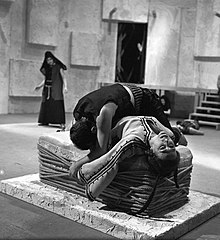
Back Orestie ALS أوريستيا Arabic Орестия Bulgarian Orestea (Èsquil) Catalan Oresteia Czech Orestien Danish Orestie German Ορέστεια Greek Orestiado EO Orestíada Spanish
| Oresteia | |
|---|---|
 SNG Drama Ljubljana performs an adaptation of The Oresteia, in 1968 | |
| Written by | Aeschylus |
| Original language | Greek |
| Genre | Tragedy |
The Oresteia (Ancient Greek: Ὀρέστεια) is a trilogy of Greek tragedies written by Aeschylus in the 5th century BCE, concerning the murder of Agamemnon by Clytemnestra, the murder of Clytemnestra by Orestes, the trial of Orestes, the end of the curse on the House of Atreus and the pacification of the Furies (also called Erinyes or Eumenides).
The Oresteia trilogy consists of three plays: Agamemnon, The Libation Bearers, and The Eumenides. It shows how the Greek gods interacted with the characters and influenced their decisions pertaining to events and disputes.[1] The only extant example of an ancient Greek theatre trilogy, the Oresteia won first prize at the Dionysia festival in 458 BCE. The principal themes of the trilogy include the contrast between revenge and justice, as well as the transition from personal vendetta to organized litigation.[2] Oresteia originally included a satyr play, Proteus (Πρωτεύς), following the tragic trilogy, but all except a single line of Proteus has been lost.[3]
- ^ Porter, David (2005). "Aeschylus' "Eumenides": Some Contrapuntal Lines". The American Journal of Philology. 126 (3): 301–331. doi:10.1353/ajp.2005.0044. JSTOR 3804934. S2CID 170134271.
- ^ Euben, J. Peter (March 1982). "Justice and the Oresteia". The American Political Science Review. 76 (1): 22–33. doi:10.2307/1960439. JSTOR 1960439. S2CID 145245951.
- ^ Smyth, H. W. (1930). Aeschylus: Agamemnon, Libation-Bearers, Eumenides, Fragments. Harvard University Press. p. 455. ISBN 0-674-99161-3.